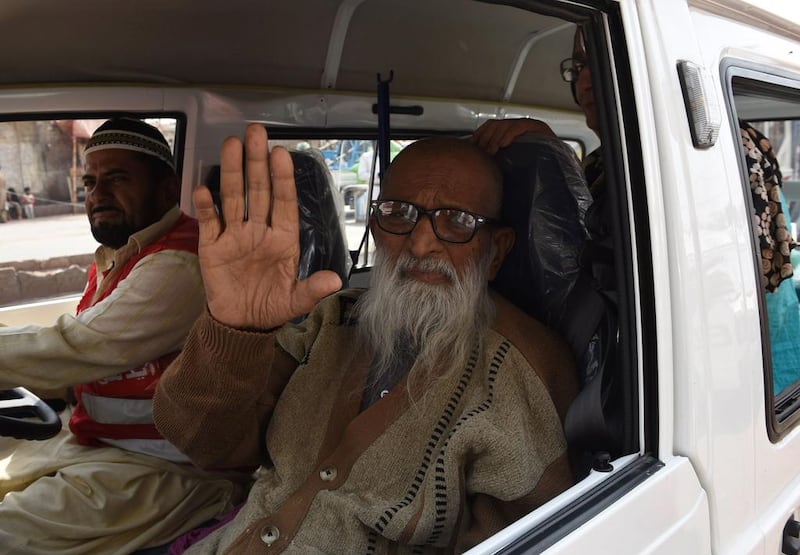In my nine years as a journalist, I interviewed many people, including heads of state, celebrities and intellectuals. But the one who meant the most to me, the one I most looked forward to, and thought so much about, was the brief interview I had with Pakistan’s most beloved son, Abdul Sattar Edhi, who died on Friday night.
I grew up seeing Edhi’s name blazoned across my father’s home town of Karachi: on ambulances, volunteer vests and health facilities. He was a man so committed to helping others that his very name was a synonym for service.
In a country where governments failed, state services floundered and religious groups battled, the Edhi Foundation was the one reliable constant. The Edhi Foundation includes the world’s largest volunteer ambulance service, hospitals, clinics, shelters, orphanages, blood banks, drug rehabilitation centres, morgues and teams that provide emergency rescue, disaster relief, the recovery and burial of the unclaimed dead, and many other services. It feeds, clothes, shelters, treats, recovers, buries and loves the unloved, forgotten and orphaned of all sectors of society across Pakistan.
And yet the man whom the foundation was named looked like little more than a neighbourhood prayer leader, with his iconic long straggly white beard, modest shalwar kameez and battered Kashmiri topi on his head. He was utterly unsophisticated. He famously owned only two outfits, which he would wash by hand and rewear. In a part of the world infamous for the corruption of its leaders, Edhi lived like a pauper while having access to millions through the donations his organisation attracted from around the world. Such restraint and morality in the face of such huge opportunity is nearly unheard of in the Indian subcontinent.
When sectarian violence would periodically break out in Pakistan, and after the world looked at Muslims as terrorists, we would point to Abdul Sattar Edhi. He was our example of the good of Pakistan and Islam. He lived the true spirit of his religion and treated all his compatriots equally, defying sectarianism, ethnocentric bias and all other social divisions. He gave Pakistanis and Muslims in general something to be proud of. He was the best of us.
And while such stories and perceptions of Abdul Sattar Edhi seemed mythical, he was a real person. A living saint in the league of Mother Teresa. So you can understand why I wanted to get a measure of this man. To crack the mystery. To get a sense of the essence that made such an exception possible. I thought, maybe if I understood what made Edhi tick, I would be able to unlock such a capacity within myself.
My interview with Edhi was brief, but not from lack of trying on my part. Somehow, despite him being hard of hearing and my Urdu being quite poor, we managed to speak on the phone. He was simple in his language, gruff even. I wanted to make a personal connection with Edhi, but all my attempts at drawing him out were a failure. This man known for his frugality had no time to waste and no words to spare.
When I asked what motivated him, in the hope of an iconic sound bite, I heard his exasperation at the other end of the line. I can’t remember his exact response, but I remember the nub: there are things that needed doing and he was trying to do them. He wouldn’t even plead or pitch for volunteers or donations. He said his foundation had enough helpers and resources to do good. He just needed to get on with it.
That was pretty much it. But it was something that has stuck with me these past 11 years. Though Abdul Sattar Edhi had been in the public eye since he established the Edhi Foundation in 1957, he was not the celebrity type. There was no ego; no self-aggrandisement. No matter how well-researched or eloquent my compliments, I could spark no self-satisfaction from him. No questions or small-talk could induce him to speak about himself or anything other than the work at hand.
And that was enough to prove to me that the man was all that I’d hoped – a true hero. Someone who was doing good purely because he felt that it needed to be done. He wanted no accolades, kickbacks or fame. He just wanted to serve, in a country where so few had the bravery, selflessness and dedication to do that.
So you can imagine the loss felt at the news of his death. Abdul Sattar Edhi was the real deal. He was a legend, a hero and saint. Such individuals come along only once in an age. The hole his absence makes will be impossible for any one person to fill.
That’s why we must all step forward and try to fill it together. Let’s honour his memory by sharing his mission. You can donate to and volunteer with the Edhi Foundation at edhi.org.
Zarina Khan is a former journalist who is acting research communications manager at the Masdar Institute





